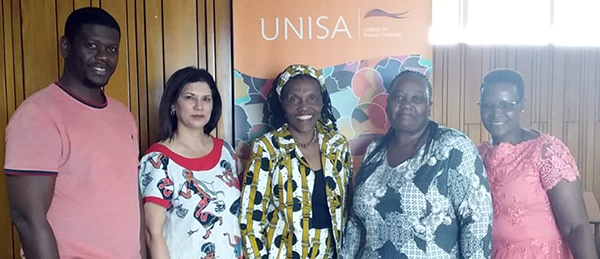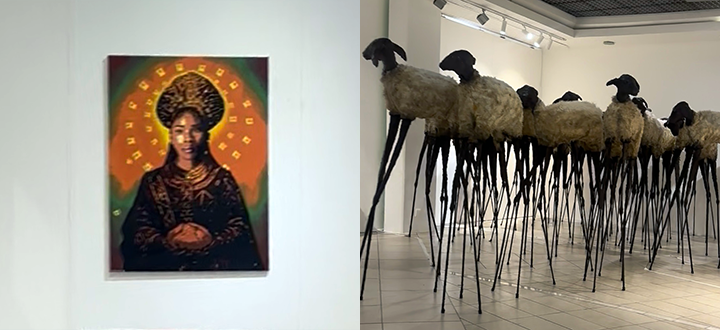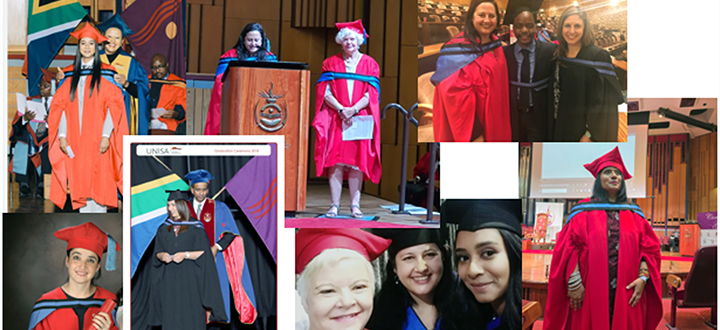College of Human Sciences
Stop telling women that their feminine face is not a representation of God
Unisa's Department of Philosophy, Systematic and Practical Theology, in the College of Human Sciences, hosted a public lecture on 18 February 2020 on gender and religious leadership. The lecture was delivered by Prof Esther Mombo, from the Faculty of Theology at St Paul’s University in Limuru, Kenya. The purpose of the lecture was to provide information based on her research, which is on what prepares women for leadership in religious spaces.
Based on her research, Mombo revealed that women were not allowed to study theology and to be ordained until activists from the Reformed Church of East Africa, and others, lobbied to be ordained. "They asked for an opportunity to lead, to read the Bible, to preach within their churches," she said. These women, she added, were taking up space to lead, and were then eventually supported by male theologians and priests within the church. "These women were being theologically empowered."

Dr Gift Baloyi (Discipline leader for Practical Theology), Prof Marilyn Naidoo (Department of Philosophy, Systematic and Practical Theology), Prof Esther Mombo (Faculty of Theology, St Paul’s University, Kenya), Rev Purity Nomthandazo Malinga (first female Presiding Bishop of the Methodist Church of Southern Africa) and Nonnie Jacobs (master’s student in Practical Theology)
Culture formulated by those in power
She said it was important for women to question the structures that do not allow them to be ordained and lead. Why is the church leadership largely male? She said that men quote from the Bible to have authority in this regard. According to her research, the Bible is often regarded as a book that only men are allowed to interpret; hence they are given more authority over women. Therefore, in their constitution, the priest, biologically speaking, should be a man.
Why is the church leadership largely male?
Mombo also spoke about culture, how it can include and exclude, and how it is formulated by those in power. Those in power, she said, are often men; therefore, women have been socialised to fear power. This, she said, is a possible explanation for why in some churches, you will find women saying that they are comfortable with only men being ordained or with men being appointed to leadership positions.
Providing more food for thought, she said: "If the Bible says men must lead, and if you look at the task of leaders, which includes planning, organising, and executing, then leadership is not just masculine." She said that if leaders in religious spaces are "chosen by God", and that leadership is about representation, "we are then telling women that their feminine face is not a representation of God". Mombo added: "Patriarchal leadership styles are hierarchical, and until this paradigm shifts, women will be excluded from leadership in their religious spaces."
Create the spaces
She also spoke about a book that she co-authored titled, If you have no voice, just sing. The book is a narrative about women in theological education. She said the reasoning behind the title was linked to a comment made by a colleague’s son who one day asked her, "Aunty Esther, how can you sing if you have no voice?" In what can only be described as a light bulb moment, she explained how she translated this statement into her work. She said it meant that if there’s no space for female leadership in religious spaces, they had to create the spaces.
The lecture was streamed live via the College’s Facebook profile. You can watch it here.
* By Gertrude Rantho, COMSA executive member & Rivonia Naidu-Hoffmeester, Communications and Marketing Specialist, College of Human Sciences
Publish date: 2020-03-04 00:00:00.0


 From unemployed graduate to business founder
From unemployed graduate to business founder
 Multidisciplinary showcase set to celebrate the creative achievements of Unisa art students
Multidisciplinary showcase set to celebrate the creative achievements of Unisa art students
 Cheers! Unisa toasts its award-winning student brewers
Cheers! Unisa toasts its award-winning student brewers
 Building a community of strategy-as-practice researchers
Building a community of strategy-as-practice researchers
 Matrimonial magnificence as husband and wife graduate at Unisa
Matrimonial magnificence as husband and wife graduate at Unisa